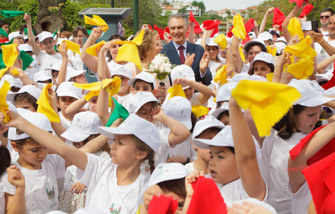
Honourable Speaker of Parliament
Honourable Prime Minister
Honourable Ministers
Honourable Members of Parliament
Members of the Family of Aquilino Ribeiro
Ladies and Gentlemen,
The tribute we are today paying to the figure of Aquilino Ribeiro is, first of all, a tribute paid to Portuguese culture.
In truth, the transfer of his mortal remains to the Santa Engrácia National Pantheon, where he will be laid to rest beside the great figures of Portuguese Culture and History, is a symbolic but very significant means of evoking the memory of one of the great writers of twentieth century Portuguese literature.
The vast number of novels written by Aquilino Ribeiro, which singularly picture the Portuguese rural world, continues with us, even if only rare traces remain in these days from that world.
The world of Aquilino Ribeiro, peopled by the characters we all know, especially that of «Malhadinhas» is the Portuguese world. We enjoy his archaic figures and his regional feelings because that is how we see ourselves. And because, in spite of the times gone by, we keep finding the Portuguese individual in each page of the great books of Aquilino. At heart, because we can still see our own selves in immortal works such as A Casa Grande de Romarigães (The Manor of Romarigães) or Quando os Lobos Uivam (When Wolves Howl).
Aquilino Ribeiro was also an admirable biographer of historical figures, such as Luís de Camões or Camilo Castelo Branco, and an author of very touching children’s books, especially O Livro de Marianinha (The Book of Marianinha), dedicated to his granddaughter, or O Romance da Raposa (The Romance of the Fox). He was also a notable memorialist who left us that interesting testimonial called Um Escritor Confessa-se (An Author’s Confession).
Aquilino Ribeiro, however, did not need to confess in an autobiographical text, because in all of his work biography and fiction cross each other at every step. The stamp of ruralism is present in almost all of his books. He was forever faithful to his origins – and these are the essence of his work. But what is equally surprising and fascinating in his work is Aquilino’s capability to transcend the limits of the Beira (a province) in which he was born and become a worldwide known author.
In effect, Aquilino is not just a regional author, susceptible to be read only by those who are well acquainted with the land and the peoples of which he writes about. He produced Geografia Sentimental (Sentimental Geography) – the name of one of his more captivating books – but knew how to surpass the limits that this love for his roots could have compelled in him as a writer. This is only possible because Aquilino Ribeiro described environments and landscapes but, above all, captured that which is the more remarkable and deep-laid in human nature, both in its greatnesses and in its weaknesses.
Reading Aquilino Ribeiro is reading a certain Portugal, but it is equally reading the universe. And for this reason, I am publicly acknowledging a literary work which I hope will continue to be read and loved by our Country’s future generations.
It is also on behalf of those generations that we justify the tribute we are paying today, in the National Pantheon, to the work of Aquilino Ribeiro.
Thank you very much.
© 2006-2016 Presidency of the Portuguese Republic
You have gained access to the records of the Official Site of the Presidency of the Republic from 9 March 2006 to 9 March 2016.
The contents available here were entered in the site during the 10 year period covering the two mandates of President of the Republic Aníbal Cavaco Silva.